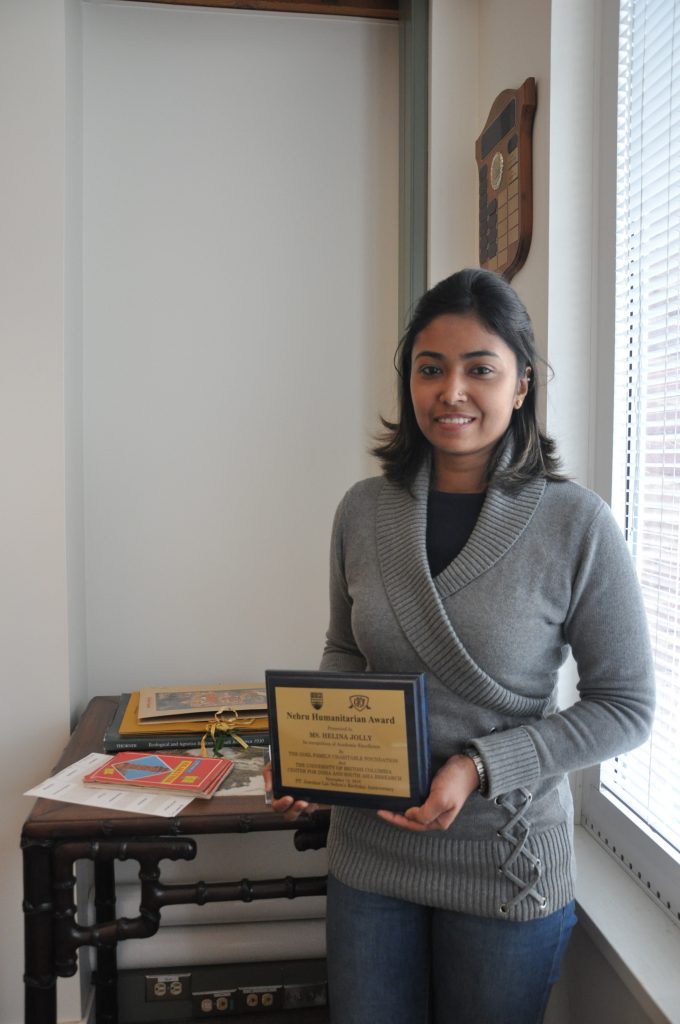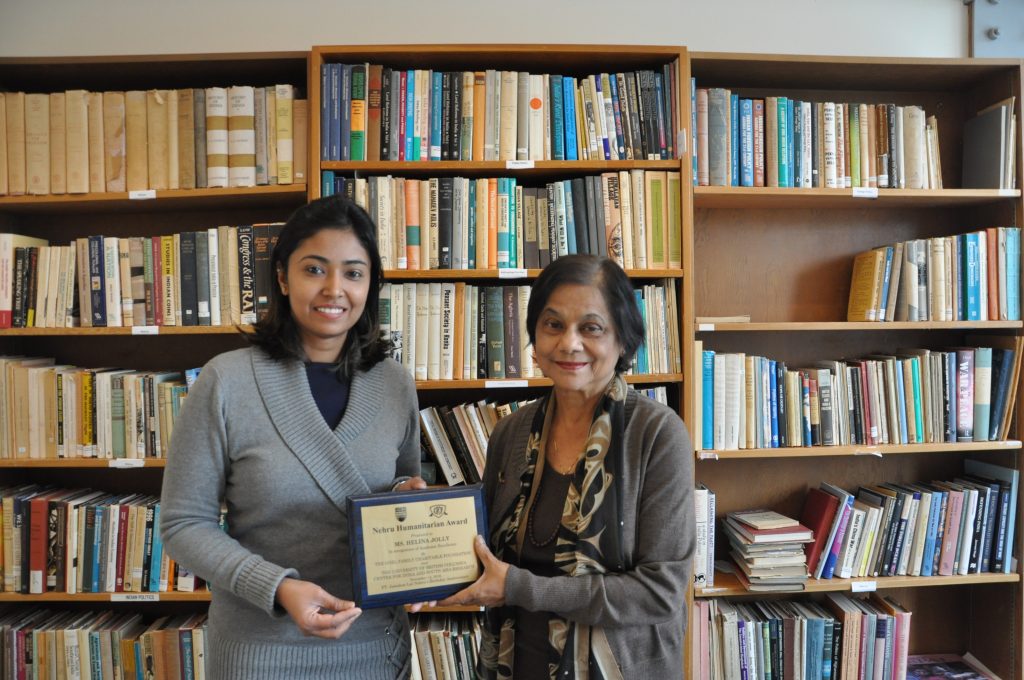Interview with Helina Jolly, a PhD student in the Institute for Resources, Environment and Sustainability. Jolly was the recipient of the Nehru Humanitarian Graduate Award in 2016.
 C: Congratulations on receiving the Nehru Humanitarian Award and thank you for coming in for this interview. I would like to invite you to give us some background on your research.
C: Congratulations on receiving the Nehru Humanitarian Award and thank you for coming in for this interview. I would like to invite you to give us some background on your research.
H: Firstly, I would like to thank Dr. Mandakranta Bose for inviting me over here and I am really honoured to be here giving this interview.
My research will be focusing on how distinct a woman’s relation to nature is from that of a man in indigenous forest based communities of India. There is a belief that women are inherently closer to nature than men and in my study I would like to understand whether there is existence of gendered preferences towards Ecosystem Services (ES) among forest dependent communities in Western Ghats (Kerala, India) and if these preferences are reflected in the economic valuation of ecosystem services of these community members.
“I hope, that through my research I would add value to the existing natural resource management regimes and bring forth a compelling economic logic to help governments of countries, especially developing countries promote conservation and protection of women in rural communities.”
C: What led you to be interested in the field you are in now?
H: I would like to answer this question in two parts:
I am a native of Kerala and grew up in one of the rural Kerala villages that linger on in the music and stories of folklore. The proposed study site for my research is Wayanad district in Northern Kerala, India. Wayanad has the largest population of aborigine people in Kerala. The indigenous communities in Wayanad live in thatched roof, mud, bamboo and brick houses close to nature and follow their distinct cultural practices. I still remember one of my first visits to Wayanad and how I found the place truly magical! Nestled in the beautiful forests of Western Ghats, Wayanad is ecologically and culturally rich. This love for Wayanad in me deepened over the years.
After graduating from the London School of Economics, I returned to India and started working in a national project – TEEB (The Economics of Ecosystem Services and Biodiversity). During my work I got the opportunity to delve deeply into the literature of natural resource management and interact with several indigenous communities of India. In natural resource dependent indigenous communities like those in Kerala, it is often observed that men and women use resources differently. Historically, men are known to value provisioning ecosystem services (deriving direct monetary benefits) while women were observed to value the cultural and regulatory services of nature more. These distinctions in the way men and women perceive nature lead to my research and Wayanad became my obvious choice to test these research questions.
In my quest for a suitable graduate program, I was thrilled to learn about the research conducted at the Institute of Resources, Environment and Sustainability (IRES) at UBC, and specifically the work of Dr. Terre Satterfield and Dr. Milind Kandilikar. Having a multidisciplinary academic training in natural sciences, environmental economics and policy regulation, I realized that the research approach at IRES suited my academic ambitions very well.

Helina Jolly with Dr. Mandakranta Bose, Director of CISAR
C: Could you provide us with some details on your academic and professional backgrounds?
H: I did my Bachelors in Zoology from University of Kerala, Trivandrum and Masters in Environmental Biology from the University of Delhi and was first rank holder in both the Universities. Afterwards, I went to London School of Economics and Political Science to pursue my second Masters in Environmental Policy and Regulation on a Commonwealth Scholarship. At LSE, I was worked with Dr.Susana Mourato on the role of Citizen Science Projects in improving environmental awareness. After graduation I returned back to India and for the past 6 years I have been working on several environment and development projects in South Asia.
C: What are the long-term goals of this research?
H: The struggles of indigenous communities in India resonates with communities across the
world. Most of these communities have a huge dependency on natural resources for subsistence and exhibit a strong cultural connection to nature. These indigenous communities share stories of oppression and forced displacement from nature and their culture. The narratives of oppression, be it through colonization, the caste system or feudal systems often speak of multiple injustices. Where, more often than not, the brunt of the cost of natural resource degradation is borne by the women. I hope, that through my research I would add value to the existing natural resource management regimes and bring forth a compelling economic logic to help governments of countries, especially developing countries promote conservation and protection of women in rural communities.
C: What other change do you hope to enact with your work?
H: As a part of my research, I plan to organize few workshops in the study area, where I would collaborate with local NGO’s, schools and organize classes on the economics of biodiversity. Most of the people in my study area do not relate to the concept of economic valuation of nature and often underestimate its value. Through these workshops I intend to make the local people aware of the richness of biodiversity and improve their negotiation skills with government agencies and land developers. I will use the Nehru Award to conduct one of these workshops in Wayanad.
C: Your research is definitely applicable to the experiences of many indigenous communities around the world, including the First Nations. What other impacts do you expect down the road?
H: I definitely think my research would have lessons on natural resource management which could be translated for the First Nations in BC, Canada. Women in indigenous communities across the world probably share a similar narration of unequal and unfair access to the use of natural resources. These demonstrate how the consequences of ecosystem degradation are borne differently by men and women and how improper decision making in regard to natural resources affects both groups differently. A better examination of the effect of gendered preferences on economic valuation of nature could, ultimately, have a constructive impact on societal investments made when managing and protecting natural resources.
Thank you so much for taking the time to come in Helina, we at the Centre wish you the best of luck and look forward to hearing from you again in the future!
Interviewed by Chandima Silva